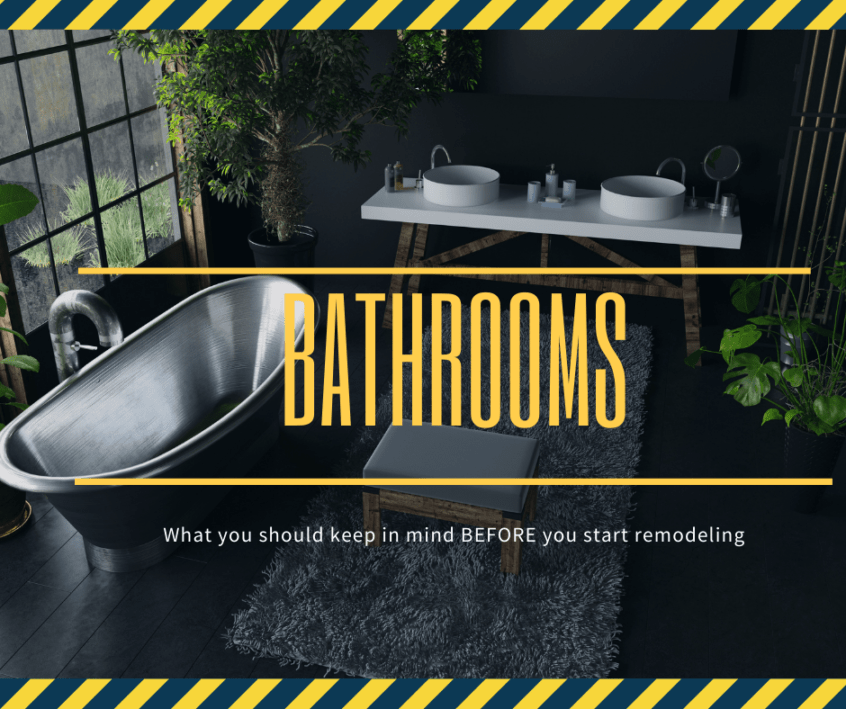Renovation on any part of the home may be exciting but it can also be a very challenging project. Choosing to undergo a bathroom remodeling upgrade is tricky because you need to ensure that aside from being comfortable and practical, it should add value to your property. The tips below will serve as a guide which will enable you to master the remodeling project you’ve decided to embark on.
Most bathroom remodeling are complex enough as to hire a professional but these tips have been carefully compiled to ensure that the overall experience as well as the outcome won’t be a disaster just in case you decide to go the do it yourself route.
Assess Your Needs
The main questions you need to ask yourself are, “Why do I need to do a bathroom remodeling?” and “What are you looking for in the bathroom?” Most homeowners would say that they need for more space and that there is a need to update the obsolete bathroom design. Usually the complaint for outdated bathrooms is that the tub is too small or the fixtures aren’t very nice. Once you’ve identified the main issue with the bathroom, carefully consider your lifestyle and how the bathroom is used. Lastly, think about how many times and how many people use the bathroom and the required amenities. This will be the basis for the remodel design.
Get Inspired
Once you have an idea of what you want as well as need, it’s time to get ideas on the look of the renovated bathroom. Flip through magazines and view some store displays to get your creative juices flowing. Make sure to take note of the look that you are gravitating towards.
If you have a contractor, show them your ideas and solicit their opinion and any suggestions they may have. If you do not have a contractor, it is definitely a good idea to find one that can offer design services. These design-build contractors can offer not only great ideas for your project but also offer a realistic budget. It doesn’t make sense to design a bathroom you cannot afford to get built.
Storage is Essential
The bathroom is your designated space for grooming as a result, it’s imperative that you have enough surface area to set things down on. You will be storing a number of grooming items hence the need for adequate storage. Consider having customized built-in shelves that are placed between the wall studs to save on space.
Lighting and Ventilation
Keep in mind that moisture is deadly to a bathroom. Not only does it cause mildew and mold but it also reduces the lifespan of painted surfaces and finishes. One of the best solutions we can offer is a bathroom fan which can regulate the air and temperature of the bathroom.
When it comes to lighting, a ceiling fixture can function as your general light but it is recommended that you have task lights on important areas. Your vanity would benefit from a vertical fixture that will minimize the casting of shadows. You can also have spotlights for the shower and toilet that will not only add functionality, but also add a visual element due to the bathroom remodeling.
Workout a Timeline
Identify the best time for you to undertake the project. Inquire with the rest of the household as to the most convenient time to begin the remodel. Map out everyone’s schedule for the coming months. Without consulting your household, you run the risk of overlooking visiting guests and the inconvenience of having a bathroom under construction.
It’s best not to rush the project but if you have a short timeline for this, you will probably need to make sacrifices including allowing contractors to start early in the morning until late in the evening or even working on weekends to meet your deadline.
Budget Budget Budget
When creating your budget for a bathroom remodeling project, you need to find the balance between what you can afford and what you hope to achieve. You need to have a detailed budget; take the time to sit down and carefully map out your finances including what you already have and if necessary, what you will need to fund source, possibly through a loan. When developing your estimated budget, remember that labor will take up a majority of the bathroom remodeling cost. Aside from this, include a contingency fund, at the very least 10 to 15 percent of the total cost. Should something go wrong, you will have a windfall that will save you the anxiety of having to scramble for supplementary funds.
A common mistake homeowners make is to cheapen out the on important items that you use the most in the bathroom. The shower, counters and the sink are some of the areas that get the most mileage so it’s best to go for quality when budgeting for these items. Areas you can save on include light fixtures and you definitely don’t have to go for the luxury toilet. A functional mid-range toilet should do the trick.
Finally, a quality bathroom designed and build by a licensed contractor will be more expensive than just replacing tiles and cabinets by a handyman. Sometimes as much as double the price but keep in mind a licensed contractor will be pulling all the right permits, getting all the inspections needed and most importantly providing an enforceable warranty.
If you do not have a budget on mind, a contractor should be able to give you some price ranges, so you have an idea where you stand. For a more detailed and accurate pricing hire a design-build contractor that can design and create a detailed scope of work. This might cost you some money upfront, but it will be well worth it and save you lots of headaches trying to figure out a lot of these details by yourself.
Finding the Right Professional
Don’t be hasty when choosing your contractor. You need to be able to rely on the contractor and their team so take the selection process seriously. When interviewing possible contractors for the bathroom remodeling project, be consistent when conducting your assessment so that you have a basis for comparison; some of the things to look for are:
1) Are they licensed? Most states require a contractor license to perform this kind of work and permits will need to be pulled. Be wary of contractors that try to avoid pulling permits or request you pull your own permits.
2) Are they properly insured? Lots of contractors try to lower their expenses by getting the cheapest insurance they can get. Many just get a handyman type insurance that’s not appropriate nor would cover damages if something happened on your job
3) Do they do this type of project on a regular basis? Many contractors only do complete bathroom remodeling occasionally and might not have the proper experience to execute your project.
4) Do they offer design services and have a showroom? This might be key for you as you might want to have somebody that can design this project for you and guide you with material selections and ideas instead of yourself acting as your own designer.
5) Do they ask for excessive upfront payments? Up to 25% deposit is standard while the rest should be paid upon reaching certain milestones. If anybody is asking for 50% or more, they might not have the financial capability to handle your project and might put you in a disadvantage if something goes wrong.
Be critical in the review of their proposed budget. Make sure you find someone that is willing to take the time to explain the finer details of the project so you are appraised as to how they will proceed with the project. Request for a list of references and find out what previous clients have to say about the said contractor.
Put everything in writing prior to commencing the project. There should be a detailed description of the work to be performed as well as specific allowances per items like flooring, cabinets, countertops, plumbing fixtures, etc. Unless you have made all your selections before signing the contract, you will want to have specific allowance amounts for your selections. Ensure that there is an approximate start and finish date. Request for detailed milestones to monitor progress to make certain project completion will be as scheduled. Other elements that to be reflected in the contract include a payment schedule, termination clause as well as warranties and responsibilities.
The most important reminder for you, as the client, is to trust your instincts. Observe the way in which they conduct business as well as the way them present themselves. This is a good basis of evaluating their work ethic and professionalism.

